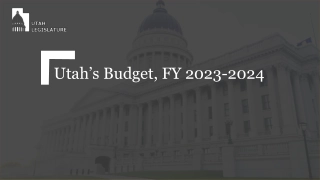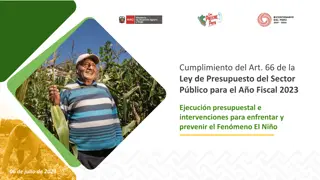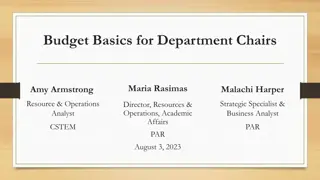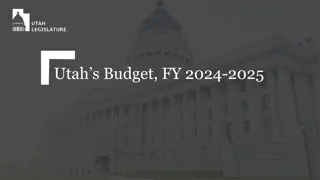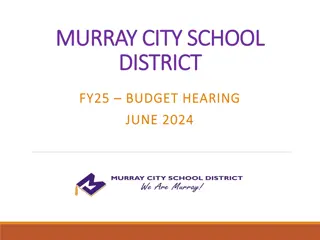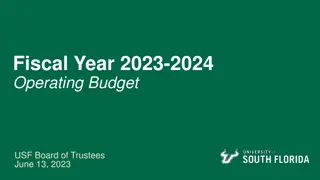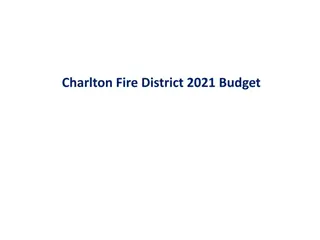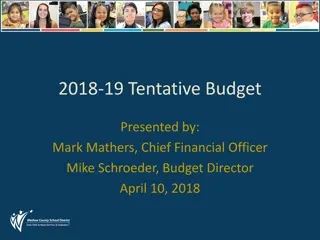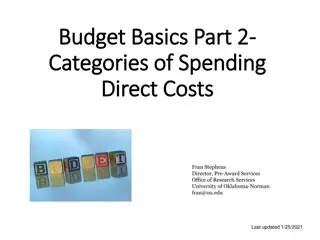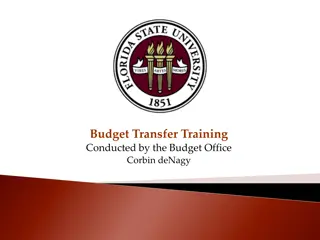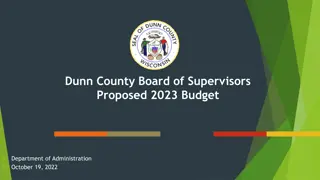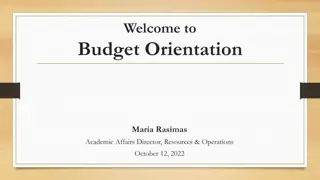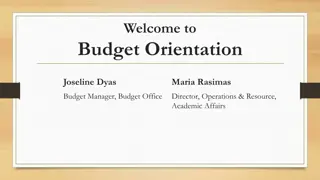HOW TO BUILD A BUDGET
Gain insights into regulations, laws, and allowable costs governing sponsored program budgets at the University of New Mexico. Learn about allowable costs, contrast with unallowable costs, and determine the reasonableness of costs. Explore examples of unallowable costs and make informed decisions on cost allowability in budgeting.
Download Presentation

Please find below an Image/Link to download the presentation.
The content on the website is provided AS IS for your information and personal use only. It may not be sold, licensed, or shared on other websites without obtaining consent from the author.If you encounter any issues during the download, it is possible that the publisher has removed the file from their server.
You are allowed to download the files provided on this website for personal or commercial use, subject to the condition that they are used lawfully. All files are the property of their respective owners.
The content on the website is provided AS IS for your information and personal use only. It may not be sold, licensed, or shared on other websites without obtaining consent from the author.
E N D
Presentation Transcript
HOW TO BUILD A BUDGET Presented by the HSC Sponsored Projects Office
Todays objectives Gain an understanding of the regulations and laws that govern how we propose our budgets Gain a better understanding of what is looked for in the budgets Answer any questions you may have
Regulations and Laws All sponsored program budgets at The University of New Mexico are governed by the Cost Principles presented in the Code of Federal Regulations at 2CFR220, also known as the Uniform Guidance (formerly the Office of Management & Budget (OMB) Circular A-21), New Mexico State Laws and University policies.
Allowable Cost What does allowable mean? An allowable cost must be: Consistently Treated- like costs must be treated the same in like circumstances, as either direct or indirect (200 C.F.R 403(d)) Reasonable- A prudent business person would have purchased this and paid this price. (200 C.F.R. 404) Allocable- It can be assigned to the activity on some reasonable basis. (200 C.F.R. 405)
Allowable costs con t Allowable costs are those that are eligible for reimbursement by the federal government and also conform University policies Contrast with: Permissible by institution: A cost is permitted by institution, as outline in its various administrative policies or procedures Allowable by the agency: Cost is permitted by the policies of the sponsoring agency or the terms or an award. An unallowable cost is one that is not eligible for reimbursement by the federal government or state law, University Policy and/ or sponsor guidelines. Examples of unallowable costs Alcoholic beverages Entertainment Fund raising Alumni events
Reasonable Cost The cost does not exceed that which would be incurred by a prudent person under the circumstances prevailing at the time the decision was make to incur the cost. (200 C.F.R. 414)
Deciding whether a cost is allowable or unallowable A cost may be expressly unallowable, i.e., it is always unallowable as either a direct or indirect. A cost may be allowable but only as an indirect (F&A) cost, not a direct charge, I.e., proposal preparation, paper, pencils A cost that is allowable as a direct charge should n ot be included in the F&A rate. I.e salary of a lab technician
How is Allocability Determined It is incurred specifically for the federal award It benefits both the work under the sponsored agreement and other work of the institution in proportions that can be determined without undue effort or cost If a cost benefits two or more interrelated projects in proportions that cannot be determined the cost may be allocated on any reasonable basis It is necessary to the overall operation of the institution and assignable in part to the award.
Components of the Budget Direct Costs Salary and time commitments (FTE) Fringe benefits and rates Equipment Travel Participant support costs Other direct costs- i.e. animals, housing for the animals Indirect Costs or Facilities and Administration General office supplies like paper, pens, pencils Salary of administrative or clerical employees The cost to heat and cool the building The cost of power to a building Cost Share or match
Direct Costs Costs that can be identified specifically with a particular final cost objective or that can be directly assigned to such activities relatively easy with a high degree of accuracy.(200.413(a)) Some examples of Direct Costs: Salaries of those working on the project Fringe Benefits Travel Materials and supplies
What are Indirect / F&A (Facilities and Administrative) Costs? Indirect costs are those that are incurred for common or joint purpose benefitting more than one cost objective, and not readily assignable to the cost objectives benefitted, without effort disproportionate to the results achieved. (200.56) Examples of F&A Administrative costs General office supplies Pay for power to your lab Waiver F&A split forms
F&A waivers and split forms Guidance form for F&A waiver found on our website. http://hsc.unm.edu/financialservices/preaward/common/docs/ guidance-docs/understanding-fa-waiver.pdf Dr. Larson is the only one who can sign http://hsc.unm.edu/financialservices/preaward/common/forms/fa- waiver-request.pdf F&A split forms are for the University s use only. Split forms should be submitted for an entire project period and done at the time of proposal. HSC internal split form is used when the F&A costs for a project will be split amongst two or more departments, schools, or colleges that are within the Health Sciences Center. When submitting to SPO, please included separate budget breakouts The Main Campus/HSC F&A Split Form is used when the F&A costs for a project will be split amongst UNM Main Campus or Branch Campus and the Health Sciences Center. Before submitting to SPO, be sure to have Dr. Larson sign first. Main campus requires that we provide the budget broken out into HSC and Main Campus.
Cost Share or Matching What is it? Cost sharing is the portion of the cost of a project that is not funded by the sponsor. Other terms for cost sharing are matching funds, institutional commitment, or in-kind contributions. A cost sharing commitment is often met with employee services valued at regular pay plus fringe benefits, but may also be met with cash (unrestricted accounts), third party contributions, un- recovered F&A costs, services or property valued with applicable cost principles, volunteer services, donated supplies at reasonable and fair market value. In any case, federal accounting requirements state that all such costs must be allowable and documented. Proposals with cost sharing must include a completed Cost Share Commitment Form. http://hsc.unm.edu/financialservices/preaward/common/forms/costshare- form.pdf Mandatory vs. voluntary Under Federal research proposals, voluntary committed cost sharing is not expected. It cannot be used as a factor during the merit review of applications or proposals, but may be considered if it is both in accordance with Federal awarding agency regulations and specified in a notice of funding opportunity. 200.306
Reading the Solicitation Sponsor and type of funding Is it a grant, contract or cooperative agreement? Expiration date Due date -Very important to let know SPO know ASAP especially if it is a federal contract Financial Limitations- Cost Share? Special Conditions
Remember who your Audience is for your budget! Chair Dean Sponsored Projects Office Sponsor Post Award Auditors
Personnel Sponsor Limitations Can the PI only work 5% FTE or are they required to work at least 50% on the proposed project? 100% Effort Issue If the PI is going to be over committed, how do they intend to adjust their time? UNM School of Medicine Faculty are only allowed to work a max of 95% FTE on sponsored projects. Senior/Key Personnel vs. Other personnel Justifying the cost!! Budget Justifications are very important! They need to meet the sponsor requirements for formatting, etc. plus calculate and match the budgets forms as well as adequately explain why these costs are necessary, allowable, allocable, reasonable, etc.
Personnel Senior Personnel / Other Personnel Costs Salary and Fringe Benefits Should be the current annualized salary plus the .81% projected increase (The IBW has the automatically built in.) A PI may not increase his or her salary beyond what is normal and reasonably anticipated (i.e. cost of living increases, etc are allowable) Be sure you are using the correct FTE when filling in the IBW (makes a huge difference when requesting salary) How are main campus salaries calculated? Fringe Benefit rates (refer to the memo) When using the IBW, Fringe benefit rates are just an estimate and use Method 2. Contract and grant accounting charges actuals. Fringe benefits consist of pension plan contributions; social security; Medicare taxes; unemployment compensation insurance; subsidies for health, life, and disability insurance; vacation; and sick leave. Effort Detail- person months Academic or calendar months NOTE: NIH salary cap is 187,000 Who pays for the cost when the salary is over the salary cap?
Admin and Clerical The salaries of administrative and clerical staff should normally be treated as F&A costs. Direct charging of these costs may be appropriate only if all of the following conditions are met: Administrative or clerical services are integral to a project or activity; Individuals involved can be specifically identified with the project or activity; Costs are explicitly included in the proposal or have prior written approval from the sponsor. (200.413)
Personnel: Budget Justification Example Good Example of Personnel Justification Dr. Cruise, Principal Investigator (1.5 months) Dr. Cruise is a Professor in the Basic Science Lab within the Department of Biology. Dr. Cruise has over ten years experience in cancer research and is an expert in the study of cancer in mice. Dr. Cruise will be responsible for maintaining the overall scientific and procedural integrity of the project, including the experimental procedures. He will conduct weekly scientific meetings with his research team to discuss relevant aspects of the progress of the project. At the completion of each data collection phase, Dr. Cruise will oversee the data analysis and will be primarily responsible for the preparation of the scientific reports and dissemination of the results of the studies.
Personnel: Budget Justification Example Bad Example of Justification Ms. Russett (1.8 CM) will assist Dr. Cruise and UNMHSC faculty and staff in administrative and planning activities including scheduling meetings and yearly travel.
Equipment Defined as having a useful life of more than one year and acquisition cost of $5,000 or more (or institutional level) Item is not already available within the university (or department) Beware of potential differences between equipment definitions (sponsor / institution /subcontractor) Justifying the cost Is the proposed equipment integral to the project?
Materials and Supplies UG definition- 200 C.F.R 453 Materials and supplies costs, including costs of computing devices. (a) Costs incurred for materials, supplies, and fabricated parts necessary to carry out a Federal award are allowable. (b) Purchased materials and supplies must be charged at their actual prices, net of applicable credits. Withdrawals from general stores or stockrooms must be charged at their actual net cost under any recognized method of pricing inventory withdrawals, consistently applied. Incoming transportation charges are a proper part of materials and supplies costs. (c) Materials and supplies used for the performance of a Federal award may be charged as direct costs. In the specific case of computing devices, charging as direct costs is allowable for devices that are essential and allocable, but not solely dedicated, to the performance of a Federal award. (d) Where federally-donated or furnished materials are used in performing the Federal award, such materials will be used without charge. Allowable only for unusual circumstances, beyond normal business operations consider the definition of an direct vs indirect costs Justifying the cost
Travel Institutional (State) policy and sponsor guidelines have to be followed. Domestic and foreign travel need to be separated Justifications should include the following: Who is traveling Where they are traveling Purpose of the travel Number of trips Cost of the air fare Per diem Lodging Car rentals and any other associated costs with the travel
Travel: Budget Justification of Travel Good Example of Travel Justification Domestic Travel: Funds are budgeted for the [PI, Co-I, or RA] to attend either one domestic conference per year of this project to present research results and/or to travel to collaborate with colleagues. Approximate travel costs are as follows: Purpose of Trip/Location (if known) Travelers XYZ Conference, San Diego, CA Lodging Subtotal Airfare Total No. of Per Diem $59 No. of Days 4 3 $95 $1,848 $750 $4,098 International Travel: Funds are budgeted for the _______ [example: PI, Co-I, or RA] to attend either one international conference per year of this project to present research results and/or to travel to collaborate with colleagues. Travel is anticipated to the following international destinations, but may be subject to change: ___________. Approximate travel costs are as follows: Travelers XYZ Conference, China 3 $155 Purpose of Trip/Country Lodging Subtotal Airfare Total No. of Per Diem $81 No. of Days 5 $3,540 $750 $5,790
Travel: Budget Justification of Travel Bad Example of Travel Justification Travel is budgeted for a total of $15,000 for Dr. Cruise to attend the annual conference of the XYZ Association, to be held in San Diego, CA and the international conference on ABC Society, to be held in Paris, France in the Spring of 2017. Dr. Cruise will present a paper covering the research conducted under this award with the intent of disseminating and sharing the results.
Consultants Defined as independent contractors, not employees , who provide a service that cannot be performed satisfactorily by existing University personnel during the performance of the project Consultant costs would include the period of service or the number of days on the project, the professional fee, travel expenses and other related expenses You can also refer to the Subaward/ Consultant document on our website to better help you determine what your classification will be. We also require a letter from the proposed consultant. http://hsc.unm.edu/financialservices/preaward/common/do cs/guidance-docs/subaward-vs-consultant.pdf http://hsc.unm.edu/financialservices/preaward/common/do cs/guidance-docs/consultant-subcontractor-sample.pdf
Sub-agreements What kind of relationship is it? Contractor (formerly vendor) vs subrecipient (formerly subcontractor) Justifying the cost
Sub-recipient or Contractor? Sub-recipient (200.93) Performance measured against whether the objectives of the federal program are met Has responsibility for programmatic decision making Has responsibility for adherence to applicable federal program compliance requirements. Contractor (200.23) Provides the goods and services within normal business operations Provides similar goods or services to many different purchasers Operates in a competitive environment Provides goods or services that are ancillary to the project Not subject to compliance requirements If you are unsure which pertains to you, fill out the form SubK v Vendor from our website and send it to us and we will make the determination. http://hsc.unm.edu/financialservices/preaward/common/for ms/subaward-versus-contractor-checklist.pdf
Documents required for a sub-recipient UNMHSC Sponsored Projects Office requires the following if you are proposing to have a sub- recipient on a project. Sub-recipient commitment form found on our website. This can also serve as a letter of intent. http://hsc.unm.edu/financialservices/preaward/commo n/forms/subrecipient-commitment-form.pdf A statement of work, budget and budget justification
Other Direct Costs Publication Costs Human Subject Incentives Only can be in the form of merchandise cards. NO CASH! Animal Per Diem Should reflect the type of animal, number of animals and the unit cost per animal Participant support costs- (excluded form MTDC base) Usually conference or workshop related Stipends Travel Subsistence Other
F&A Rates UNM s Federally Negotiated Rates- F&A agreement is found here http://hsc.unm.edu/financialservices/preaward/common/docs/g uidance-docs/fa-rate-agreement.pdf Research- 51.5% Private/ Industry/ Non-profit- 54% Also DOD contracts (not grants) Refer to memo Other sponsored programs- 43.5% Conferences Off-Campus- 26% Must meet the following criteria 1. program is conducted in a leased facility where spaced related costs are directly charged to the program 2. Or facilities made available at no cost to the program by a non- University organization If more than 50% of the project is performed off-campus, then the off-campus rate will apply
F&A Rate Base Definition Modified Total Direct Costs (MTDC) MTDC means all direct salaries and wages, applicable fringe benefits, materials and supplies, services, travel, and up to the first $25,000 of each subaward (regardless of the period of performance of the subawards under the award). MTDC excludes equipment, capital expenditures, charges for patient care, rental costs, tuition remission, scholarships and fellowships, participant support costs and the portion of each subaward in excess of $25,000. Other items may only be excluded when necessary to avoid a serious inequity in the distribution of indirect costs, and with the approval of the cognizant agency for indirect costs.(200.68)


